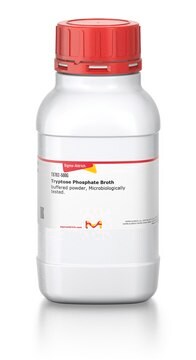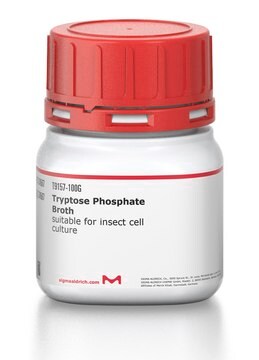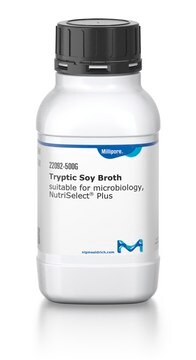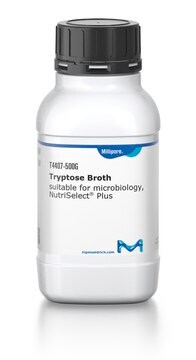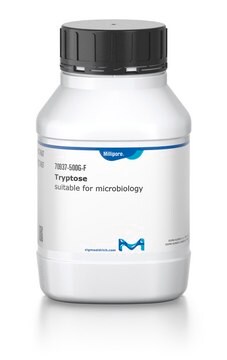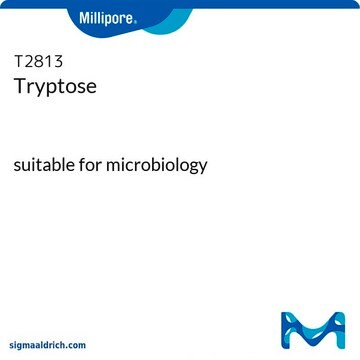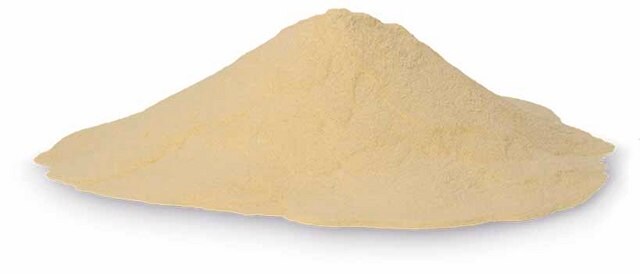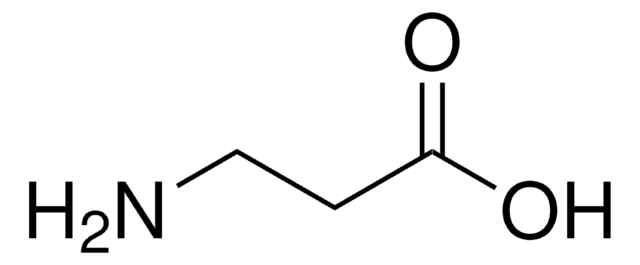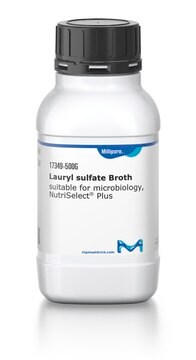T4532
Tryptose Broth
suitable for insect cell culture
Anmeldenzur Ansicht organisationsspezifischer und vertraglich vereinbarter Preise
Alle Fotos(2)
About This Item
UNSPSC-Code:
41106507
NACRES:
NA.75
Empfohlene Produkte
Biologische Quelle
Porcine pancreas
Form
liquid
Methode(n)
cell culture | insect: suitable
Versandbedingung
ambient
Lagertemp.
2-8°C
Anwendung
In addition to its use for the growth of fastidious micro-organisms, Tryptose Phospate Broth (TPB) has been studied as supplement for the preparation of media that supports vaccine production in BHK-21 cells and the growth of SF21 insect cells in high-density perfusion culture stirred-tank bioreactors.
Komponenten
Tryptose Phosphate Broth (TPB) is composed of four components: Tryptose (20g/L); Dextrose (2g/L); NaCl (5g/L) and Disodium Phosphate (2.5g/L) typically adjusted to pH 7.3. The tryptose component is a peptone (mixture of amino acids and short peptides) derived by the mixed enzymatic hydrolysis (pancreatic enzymes) of the milk protein casein. This hydrolysate provides a source of amino acid based nutrients and survival factors that support the growth of fastidious micro-organisms such as Brucella, Streptococcus, and Neisseria; as well as eukaryotic cells such as insect and animal cells. Dextrose provides a fermentable carbohydrate that can be used by fastidious mico-organisms. Sodium chloride maintains the osmotic and ionic equilibrium and disodium phosphate provides the basic buffering capacity.
Sonstige Hinweise
This Tryptose broth is closely related to Tryptose phosphate broth, but does not contain the phosphate component and it contains a lower concentration of dextrose.
Angaben zur Herstellung
This formulation contains Tryptose (20 g/L); Dextrose (1 g/L); and NaCl (5g/L) adjusted to a final pH of 7.2.
Vergleichbares Produkt
auch häufig zusammen mit diesem Produkt gekauft
Produkt-Nr.
Beschreibung
Preisangaben
Lagerklassenschlüssel
12 - Non Combustible Liquids
WGK
nwg
Flammpunkt (°F)
Not applicable
Flammpunkt (°C)
Not applicable
Analysenzertifikate (COA)
Suchen Sie nach Analysenzertifikate (COA), indem Sie die Lot-/Chargennummer des Produkts eingeben. Lot- und Chargennummern sind auf dem Produktetikett hinter den Wörtern ‘Lot’ oder ‘Batch’ (Lot oder Charge) zu finden.
Besitzen Sie dieses Produkt bereits?
In der Dokumentenbibliothek finden Sie die Dokumentation zu den Produkten, die Sie kürzlich erworben haben.
Kunden haben sich ebenfalls angesehen
S N Saha et al.
Vaccine, 7(4), 357-363 (1989-08-01)
Studies were undertaken to develop a cheaper medium with indigenous sources of peptone and casein hydrolysate for continuous culture of BHK-21 (suspension) cells and production of foot-and-mouth disease (FMD) vaccine. Eleven batches of experimental media were prepared using different indigenous
A I Josemans et al.
Annals of the New York Academy of Sciences, 969, 141-146 (2002-10-17)
The in vitro culture of Cowdria ruminantium, the causative agent of heartwater in domestic ruminants, was first achieved in 1985. Culture media were usually supplemented with serum and tryptose phosphate broth, both undefined components, contributing to great variability. Recently, we
S M Deutschmann et al.
Enzyme and microbial technology, 16(6), 506-512 (1994-06-01)
Spodoptera frugiperda insect cells (IPLB-Sf21-AE) (Sf21), infected with baculovirus expression vectors during their exponential growth phase, are commonly used to produce a variety of heterologous recombinant proteins. In the present study the culture conditions of these insect cells were studied
Unser Team von Wissenschaftlern verfügt über Erfahrung in allen Forschungsbereichen einschließlich Life Science, Materialwissenschaften, chemischer Synthese, Chromatographie, Analytik und vielen mehr..
Setzen Sie sich mit dem technischen Dienst in Verbindung.